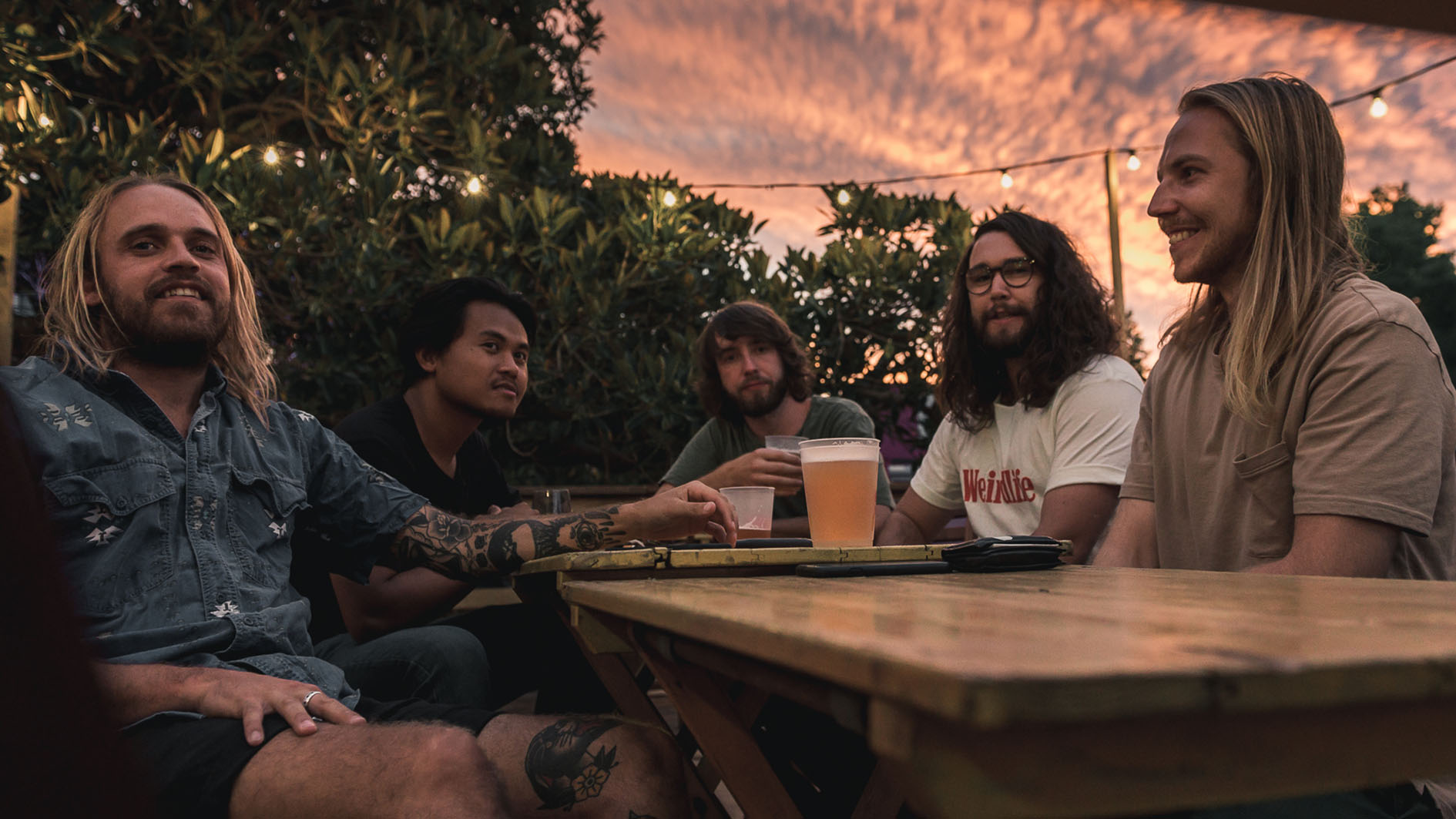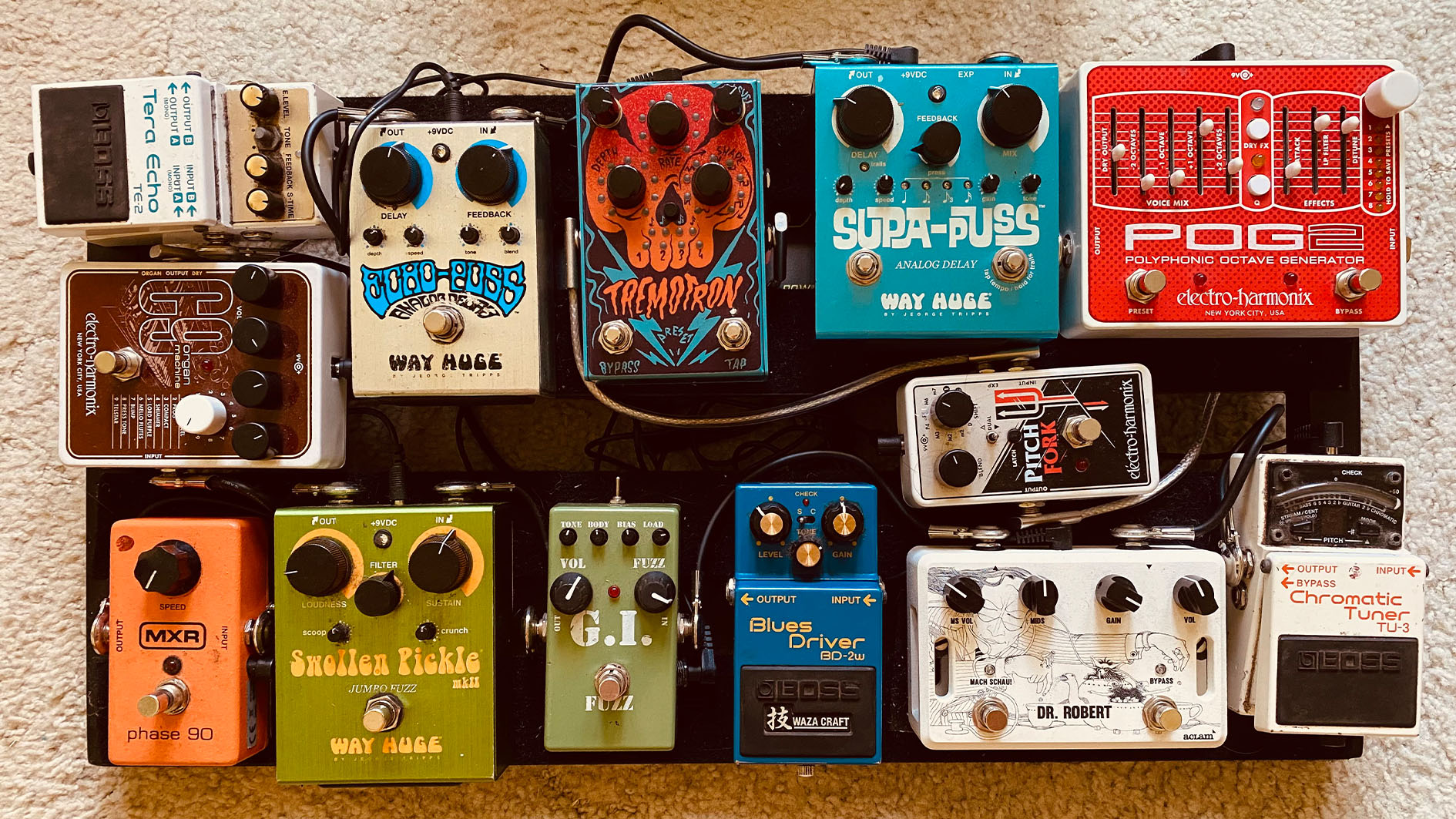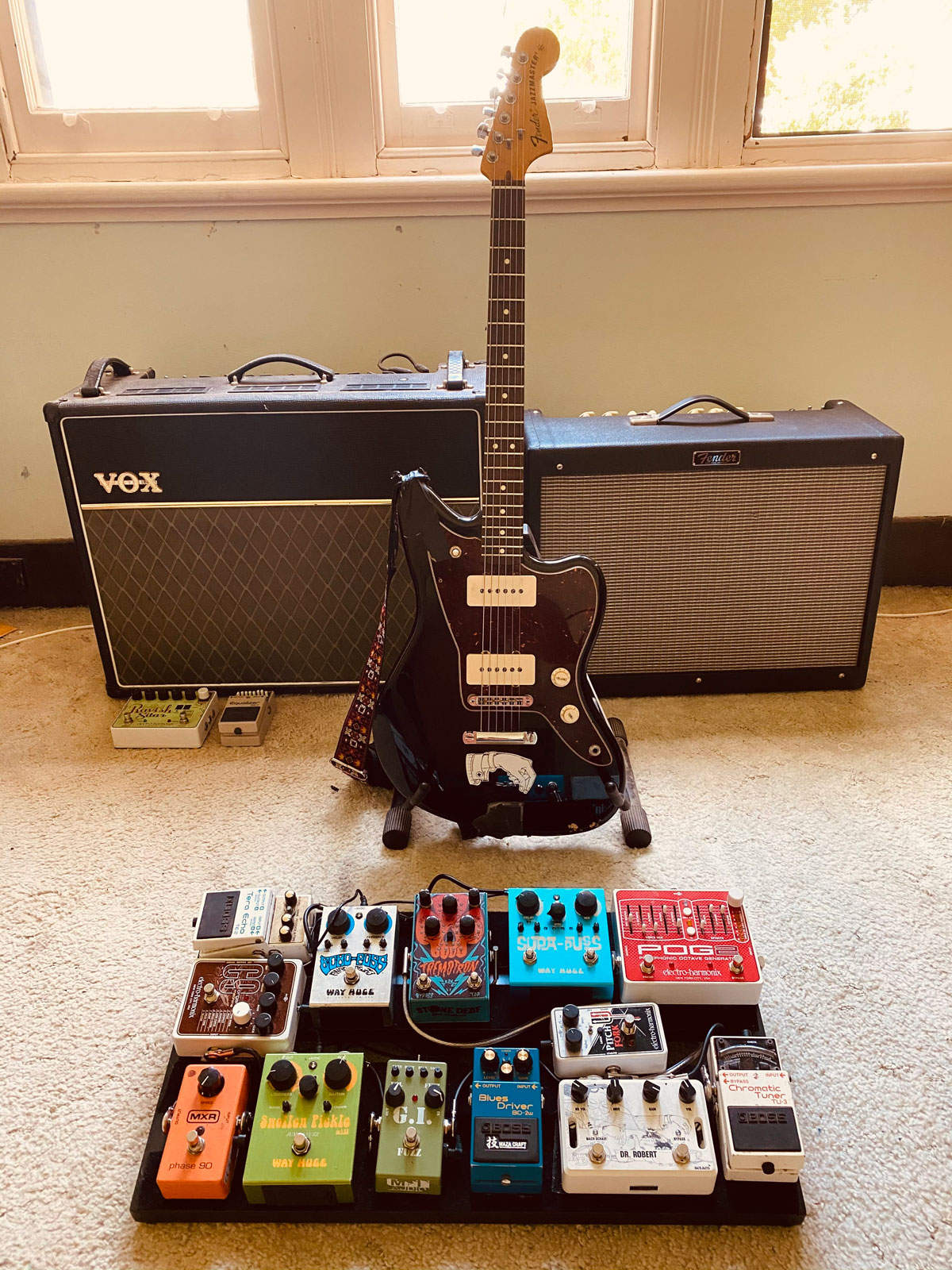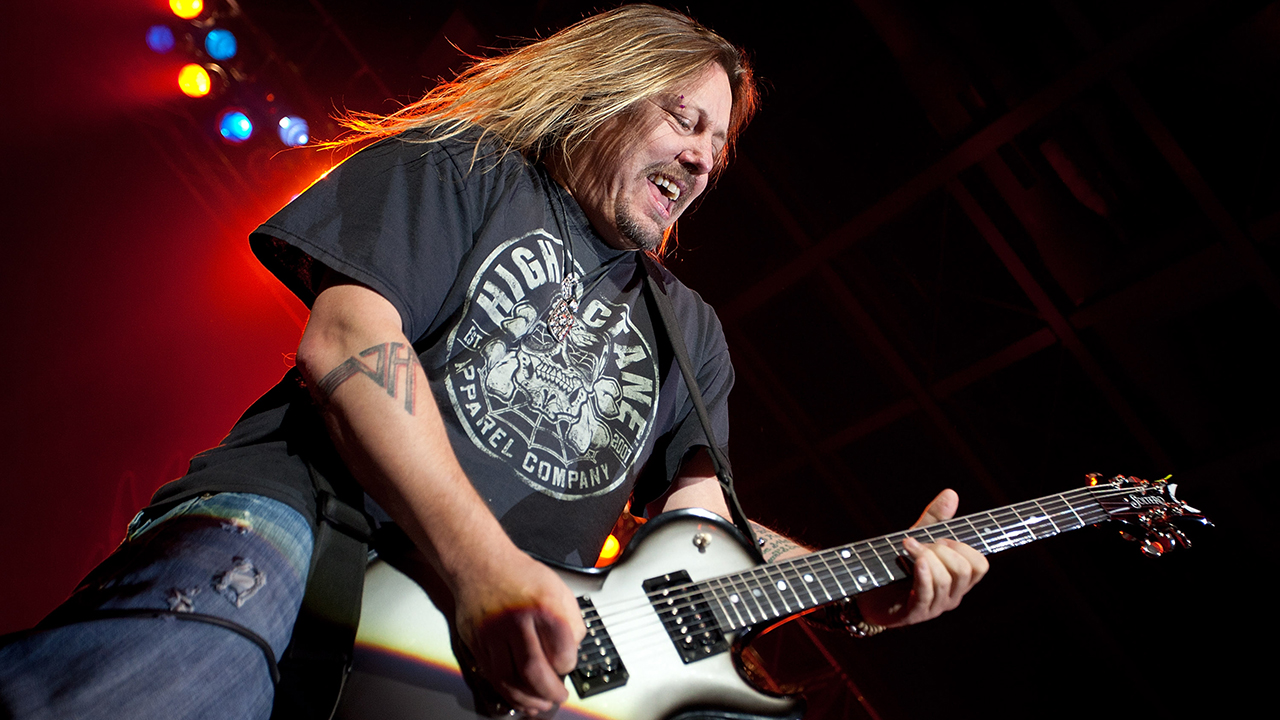Jack McEwan: “I want to forget every natural convention in guitar playing and find things that are stupid… but actually make it musical!”
The Psychedelic Porn Crumpets six-stringer on the glitchy guitar sounds and wondrous array of pedals that form the band's upcoming album, SHYGA! The Sunlight Mound

All the latest guitar news, interviews, lessons, reviews, deals and more, direct to your inbox!
You are now subscribed
Your newsletter sign-up was successful
It would be fair to say Psychedelic Porn Crumpets would be one of the more unusual names you’ll find in the great encyclopedia of modern rock groups. For that reason alone, they certainly stand out – but similar things can also be said of their hugely distinctive, if not entirely unorthodox, church of noise.
The Australian group have released three albums thus far, but it’s fourth full-length SHYGA! The Sunlight Mound that takes their kaleidoscopic manifestations into new dimensions, sounding a bit like Queens Of The Stone Age and Tame Impala having an intoxicated jam session in the early hours of the morning. It’s rich and potent formula that leaves the listener perplexed and bewildered, hankering for the next bite.
But first thing’s first – what’s the deal with naming your band after a spongy cake normally found on breakfast tables in Great Britain?
“I grew up in England and moved to Australia when I was 13,” laughs singer/guitarist Jack McEwan, who topped MusicRadar’s round-up of the best new guitar players in the world back in 2019.
“We always used to have them before school! I didn’t realize that most people put sweet things on them – it was usually HP sauce or a tomato or something, so more like toast. Then I really got into Nando’s sauce so that’s all I put on them now. I put that stuff on everything. I don’t even like Nando’s that much but the sauce is amazing.”
As fate would have it, the new album was originally set to be something quite different. McEwan had come up with the idea of a fictional character and this new offering was supposed to be a ‘Greatest Hits’ of sorts, but the idea – even by their standards – ended up feeling a bit too discombobulated and bizarre.
After careful reconsideration, the founding songwriter decided to hone in on a new sonic template, embracing the ethereal world of glitchy guitar tones...
All the latest guitar news, interviews, lessons, reviews, deals and more, direct to your inbox!
“I was actually trying to come up with ideas to build this ‘Greatest Hits Of Norton Gavin’ – this fictional character we created!” he explains. “The way I tend to write is work on a song and then work on something completely different the next day, going from metal to acoustic to something else entirely.
“It’s always quite mismatched, that’s just the way I do it. But then when Covid hit, it was kinda serendipitous. There was no timeframe or deadline anymore...
“I sat down here with Luke [Parish, guitars] and played him the record, and he basically told me it was four different albums! It just did not work cohesively. Instead of feeling angry about it, I completely agreed.
There was this really nice moment where we realized we should keep a handful of tracks – Mundungus, Mr Prism and Pukebox – using those as the catalyst to boost our sound...”
Why those tracks in particular?
“Because all of those songs were basically talking about getting fucked up, one was about getting better from pneumonia, another was about an intervention on tour and Pukebox was literally about drinking in every country with no idea where I was waking up. That became the theme!
As soon as I discovered that glitch guitar sound everything felt new and exciting, because I knew I could fuck up and manipulate notes in ways that I would struggle to play live!
“So I thought what could be a better way of making an album about alcoholism than getting drunk at 10AM in the morning.
“I’d wake up, walk to the bottle shop and end up knocking on the door before they were open. It was kinda sad I guess! But I knew the guy who worked there so I’d be like, ‘Todd, I know you are in there!’ And he’d give in.
“I’d leave the monitors on and the amp ready, just getting warmed up. I’d come back with a bottle of wine or a six-pack of something. It was in stages, so I’d do a night trip as well. I wasn’t too greedy about it, I just got what I needed.”
That’s quite an unusual way of working. How exactly did it affect your creative process?
“I got into this headspace, quite often it would be two beers drunk, that would help memories come back way easier. I remembered all this stuff that we got up to on tour which was hilarious and started to write about it.
“As soon as I discovered that glitch guitar sound everything felt new and exciting. It made guitar playing so much more enjoyable, because I knew I could fuck up and manipulate notes in ways that I would struggle to play live! And that was important… I stopped thinking about how I would play it live.
“My mission was to record. So I was going to town on writing riffs, melodies and structures. Sometimes I would play a one-note riff with a harmony on top and felt it was so Thin Lizzy and had already been done.
“So I would copy the exact same guitar part again and transpose that up an octave, but also glitch it so it’s sat on top in a really disturbing way… like a computer trying to process this harmony. And I’d do that to vocals and bass lines too, forming these weird melodies to the point where all of it playing together sounded like a really bad wind organ.”

There’s definitely a machine-like quality to layering up your music like that...
“Exactly! It added to this really shitty lo-fi sound, like a machine trying to work out a song. It really reminded me of deep fake, so I guess I would call this our deep fake record [laughs].
“I really got into that idea while writing this. Suddenly it went from writing songs to writing an album, I think I had the opening track and then the next one, and suddenly I knew how to follow it up.
“And then I knew Hats Off To The Green Bins, Glitter Bug and More Glitter would work together as one section ending in F#, leading the way to Pukebox. It suddenly became all about pacing everything, which I’ve never done before. It’s always been a stroke of good fortune rather than planning it out methodically in terms of BPMs and keys.
“Or ending one song on half time, like Sawtooth Monkfish, to make Tripolosaur sound faster afterwards. I really went to town on that, thinking about the album rather than just the songs.”
We’re guessing the Electro-Harmonix pedals on your board – like POG 2, C9, Pitchfork, Ravish Sitar – will help recreate those live...
“Definitely! Though it’s hard to say when anyone will be playing gigs again. A lot of it came from Guitar Rig pitched and manipulated in a way like I would use the Beats mode in Ableton. When I was doing DIs, it was interesting how sometimes just leaving the POG on, but with none of the functions in use, had this hum to it.

“Running through the pedal even at the very lowest settings would add this tiny little amount of octave trying to push through.”
You’re also an avid user of the Tera Echo – which is one of the lesser-known Boss pedals out there…
“I think the Tera Echo is the most unique Boss pedal of them all. I don’t think there’s anything out there that can emulate it. Other companies have their own versions I guess but nothing sounds like it. They really nailed it with the Tera Echo… and how old is that pedal now? 10 or 15 years? It’s old but so good, with its own unique flavor.
“I actually think reverb can get so corny, I ended up getting rid of my reverb pedal in the end. I would kick it in for solos and it would clean up the mistakes. But the Tera Echo adds this weirdness that I just love… it’s almost like a modulation or flanger when you stop playing. I use it to tail off bits and pieces, and when we play live I’ll keep it on to make certain parts sound even bigger.
“I have an awful technique when it comes to recording because I work on sections rather than whole takes. It’s not like I do the whole song and work out which part I like… I prefer to nail one little bit at a time, adding tails on the end of each one. That way there might be a whole bar of the Tera Echo at the end.
“To do it live will involve a lot of tap-dancing. I think I either need an extra foot or someone working pedals all the time rather than a bongo player. What a cool job that would be, a professional pedal player. Perhaps it’s the future of music!”

You’ve also spoken in the past about your addiction to fuzz pedals…
“When you are playing live, there is no way of getting that glitchy sound without a fuzz pedal on while you’re playing up the neck on the low E. You get this natural color from the fuzz trying to pick it up, which sounds sick.
For tracks like Mr Prism, I chose to play right up the neck instead of on the higher strings. I’d almost be playing off the guitar and down the bottom, sliding past the neck almost to get those weird barky sounds you hear when you bend a string off the guitar!
“It’s pretty hard to play live so I’m going to start using that ‘mistake’ technique as an effect. I want to forget every natural convention to play the guitar properly and find things that are fucking stupid and sound shit but actually make it musical!”
And it looks like there are a few Way Huge pedals on your 'board too…
“The Supa Puss is the older brother of the Echo Puss. It’s like a chorus/reverb with a delay function, but it didn’t have tap tempo, so they delay function was a bit more weak. They decided to make a better version with the Supa Puss, but it got way more chorusy.
I’d love to see a pedal that works like a Theremin sometime, so instead of using an expression control with your foot like a Whammy
“What I love about the Echo Puss is that if you have the delay off and the chorus all the way down, you get this pulsating kind of reverb which is really cool. I hadn’t heard anything like it before, like a cut-off synth. So I use that subtly here and there…”
Like you were saying with the POG, there can be a lot of advantages to using pedals in less obvious and more discrete ways…
“I like that idea of using pedals subtly – to be honest, I either use them at zero or full blast, and very rarely somewhere in the middle. For example, I like to use my MXR Phase 90 as a boost!
“If you have it turned right down and put it at the end of your drive, gain and fuzz pedals… it just kicks everything up in the most trebly way. I don’t know if they intended for it to work like that but it starts more like a high pass, rather than a low pass… which would sound more like your boards just gone off!
“It slowly wails, which I really love, and then if you have it turned right up like I did on our first albums, it’s almost more like a flanger – like this pulsating car alarm.
“I’d love to see a pedal that works like a Theremin sometime, so instead of using an expression control with your foot like a Whammy, you can use your arm or maybe the closer you get to a receiver the more it manipulates your sound. We need extra hands here!”
Are there any lesser-know brands that have been blowing your mind?
“There’s the Dr. Robert Vox emulator pedal made by Aclam Guitars which sounds like it has a tube inside it… basically it’s a Vox in a box. It has that perfect sound, almost to the point where you think the amp is about to die… there is no better sound than that. It’s like being hit in the head by a flip-flop, so I’ve been using that tone a lot. I honestly don’t know how they do it!
“Talking about it now, I realize this record is going to be so difficult to replicate, but things like that pedal are really going to help. Maybe I can just belly flop onto my pedalboard and roll around [laughs].”
Speaking of Vox – we’ve seen you use two amps, one being a Fender Hot Rod and the other an AC30…
“The Vox, god bless her, I think she’s had her last days, but I like to run it wailing. And instead of using a SM57, which gets a loud noise but not really the amp itself, I started using condenser mics at the back of the room to get the full drive.
“Obviously you get some natural reverbs too, but nowadays it’s so easy to EQ the whole thing so you use it for one particular mid frequency and sandwich the voice right there. You end up with this Eric Clapton-style Vox tone that sounds warped.
What I like about electronic and digital gear is that you literally don’t have to play, you can just copy and paste things on your DAW. Music going to be less analog in the future
“I’m a bit of a newb with Fender. I love the drive sound when it’s going at 100 and use it for cleans too, sometimes putting the MI Audio GI Fuzz in front. There’s an Australian disco band called Sugar Army, from that whole Enter Shikari movement when everyone was into really heavy subs, and they had this DI'd guitar coming out of nowhere that sat above the whole mix.
“It felt like the biggest sound I’d ever heard. Sam worked with them at Tone City Studios in Perth and told me it was that GI Fuzz pedal, so I had to go out and find one.”
Guitar-wise, are you still mainly playing Jazzmasters?
“Yeah, I play Jazzmasters but ever since Chris got his Gibson, I’ve started to think that’s the sound I’ve been looking for [laughs]. It’s weird how that thing just cuts through everything, even when clean. There’s a reason why the SG is synonymous with rock music.
“The biggest guitarist of them all, Mr. Jack Black in School Of Rock, was rocking the SG [laughs]. But what I love about Jazzmasters is the never-ending sustain. It’s not like a metal guitar sustain, there’s more of a good tone to it and even more so when you pile on the fuzz pedals.
“The more quirky the sound, the better. I use the Electro-Harmonix Ravish Sitar because it doesn’t sound anything like a sitar – and I own a sitar anyway. That pedal sounds more like a synth to my ears.
“There’s a fine line between sounding cheesy or too mean and ruining the song. What I like about electronic and digital gear is that you literally don’t have to play, you can just copy and paste things on your DAW. Music going to be less analog in the future.
“PPC aren’t really a band in that sense, it’s quite often just me recording at home. I’ll play the finished song to the other guys who will tell me it’s impossible to play. We’re like a live band trying to recreate this recorded project.
“Maybe in five years time, we’ll try to do it all for real and record it live. But right now I’m having so much fun just snipping away. It’s like a bad collage that you have to really squint to see… and then you finally realize it’s a giraffe [laughs]!”

Amit has been writing for titles like Total Guitar, MusicRadar and Guitar World for over a decade and counts Richie Kotzen, Guthrie Govan and Jeff Beck among his primary influences as a guitar player. He's worked for magazines like Kerrang!, Metal Hammer, Classic Rock, Prog, Record Collector, Planet Rock, Rhythm and Bass Player, as well as newspapers like Metro and The Independent, interviewing everyone from Ozzy Osbourne and Lemmy to Slash and Jimmy Page, and once even traded solos with a member of Slayer on a track released internationally. As a session guitarist, he's played alongside members of Judas Priest and Uriah Heep in London ensemble Metalworks, as well as handled lead guitars for legends like Glen Matlock (Sex Pistols, The Faces) and Stu Hamm (Steve Vai, Joe Satriani, G3).

